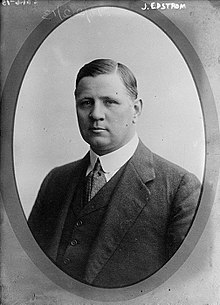Sigfrid Edström
Johannes Sigfrid Edström (born November 21, 1870 in Morlanda , † March 18, 1964 in Stockholm ) was a Swedish entrepreneur and sports official . From 1912 to 1946 he was the first President of the World Athletics Federation IAAF and from 1946 to 1952 the fourth President of the International Olympic Committee .
Life
Edström first attended the Chalmers University of Technology in Gothenburg and later studied at the ETH Zurich and in the USA . In his youth, Edström was considered an excellent sprinter, his time over 100 meters was under 11 seconds.
In 1903 Edström took on a director's position at the Swedish electrical engineering group ASEA and was chairman of the group's board of directors between 1934 and 1939.
Edström was also active as a sports official. In 1912 he took on tasks in organizing the Olympic Games in Stockholm . The International Athletics Federation (IAAF) was founded on the fringes of the event . Edström was elected its first president and held the office until 1946.
In 1920 Edström became a member of the International Olympic Committee (IOC). After a position on the Executive Committee, he was elected Vice President in 1931. In the dispute over the 1936 Olympic Games , the Nazi Games , Edström stood on the side of his friends Karl Ritter von Halt and Avery Brundage , who, influenced by fascism, supported the National Socialists' position with corresponding statements abroad. It was only after the death of the IOC President Henri de Baillet-Latour on January 6, 1942, that Edström took over the leadership of the IOC temporarily until the end of the Second World War and distanced himself from the National Socialists. At the first IOC session after the end of the war, Edström was elected as IOC president. Edström played an important role in the revival of the Olympic movement after World War II by welcoming the participation of the USSR but making it clear that his friend and IOC member must first be released from a Soviet internment camp. In 1952 he retired from office.
Avery Brundage was chosen as his successor .
Individual evidence
- ↑ Leif Yttergren, Hans Bolling: The 1912 Stockholm Olympics: Essays on the Competitions, the People, the City. Stockholmia, Stockholm 2012, ISBN 978-0-7864-7131-7 .
- ^ Arnd Krüger : Fair Play for American Athletes. A study in anti-semitism. In: Canadian Journal of the History of Sport and Physical Education. 9: 1, pp. 42-57 (1978).
- ^ Arnd Krüger : Neo-Olympism between nationalism and internationalism. In: Horst Ueberhorst (Ed.): History of physical exercises. Volume 3/1, Bartels & Wernitz, Berlin 1980, pp. 522-568.
Web links
- Biography on olympic-museum.de (English)
- Sigfrid Edström in the Munzinger archive ( beginning of article freely available)
| personal data | |
|---|---|
| SURNAME | Edström, Sigfrid |
| ALTERNATIVE NAMES | Edström, Johannes Sigfrid (full name) |
| BRIEF DESCRIPTION | Swedish entrepreneur and sports official |
| DATE OF BIRTH | November 21, 1870 |
| PLACE OF BIRTH | Morlanda |
| DATE OF DEATH | March 18, 1964 |
| Place of death | Stockholm |
